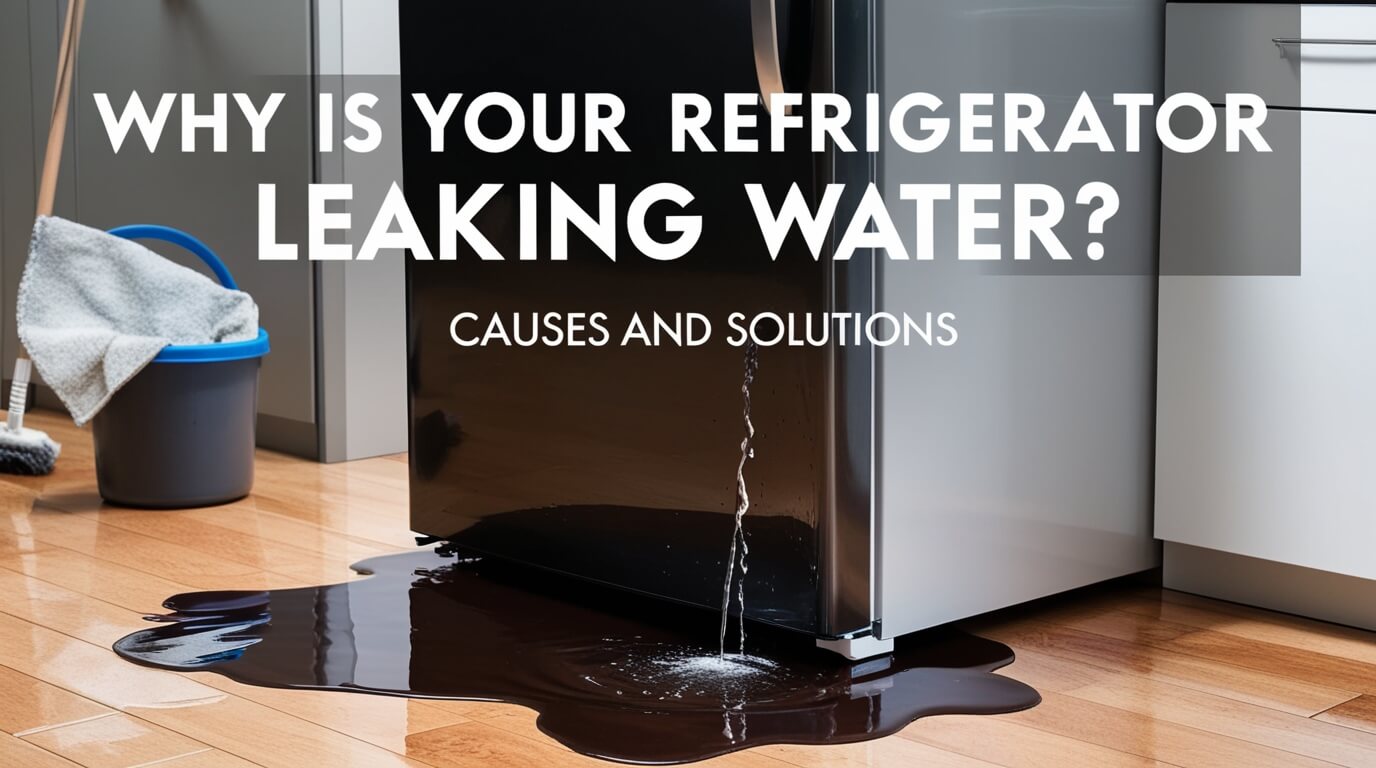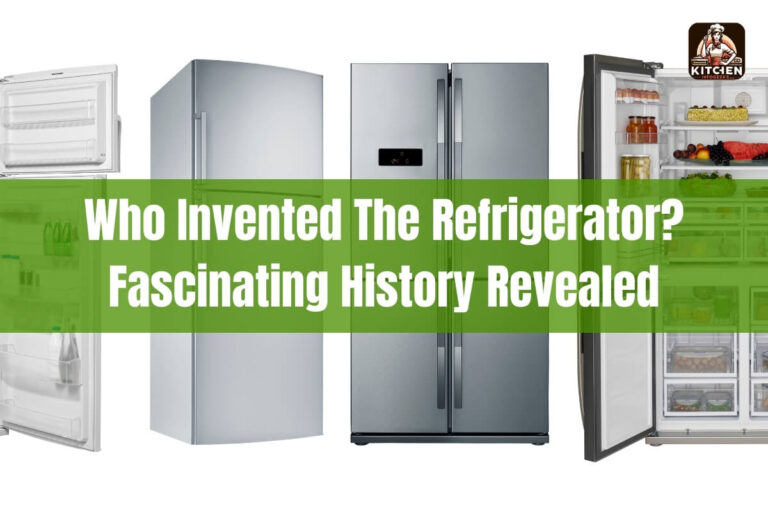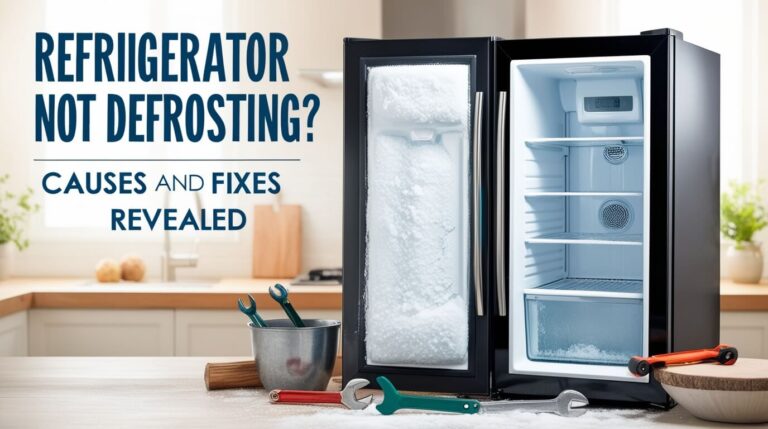
A refrigerator leaking water can be caused by issues like a clogged defrost drain, damaged water supply line, or faulty water filter. These problems are often fixable at home, but some may require professional help.
Finding a puddle of water under your fridge is never a welcome sight. It’s not just annoying—it can lead to serious damage if left unchecked. But don’t panic! Most causes of a leaking refrigerator are pretty common and often easy to fix.
In this post, we’ll explore why your fridge might be leaking, how to fix it, and when to call in the pros. We’ll also cover prevention tips to keep your fridge running smoothly. Let’s dive in!
Common Signs of a Leaking Refrigerator
Before we get into the nitty-gritty, let’s talk about how to spot a leaking fridge. Here are some telltale signs:
- Puddles on the floor near your fridge
- Water droplets inside the fridge
- Frost buildup in the freezer
- Ice maker not working properly
- Unusual noises from the fridge
If you notice any of these, it’s time to investigate further.
Importance of Addressing Refrigerator Leaks Promptly
A leaking fridge isn’t just a nuisance—it can cause real problems if ignored. Water damage to your floors, mold growth, and higher energy bills are all potential consequences. Plus, the underlying issue could worsen over time, leading to more expensive repairs or even needing to replace your fridge entirely.
Top Causes of Refrigerator Water Leaks
Now, let’s look at why your fridge might be leaking water. There are several common culprits:
Clogged or Frozen Defrost Drain
This is one of the most frequent causes of a leaking fridge. Your fridge’s defrost drain can get clogged with food particles or ice, causing water to back up and leak out.
Damaged Water Supply Line
If your fridge has an ice maker or water dispenser, a leak in the water supply line could be the culprit. This line can crack or come loose over time.
Faulty Water Filter
A poorly installed or damaged water filter can cause leaks. It’s an easy fix but often overlooked.
Cracked Drain Pan
The drain pan under your fridge collects water from the defrost cycle. If it’s cracked, water will end up on your floor instead.
Imbalanced Refrigerator
Believe it or not, if your fridge isn’t level, it can cause water to leak out. This is because the drainage system relies on gravity to work properly.
Ice Maker Issues
Problems with the ice maker, like a clogged or frozen water line, can lead to leaks.
DIY Troubleshooting and Fixes
Good news! Many of these issues can be fixed at home without calling in a pro. Let’s go through some DIY solutions:
Locating the Source of the Leak
First things first—you need to find where the water is coming from. Is it from the front or back of the fridge? Inside or underneath? This will help narrow down the cause.
Clearing a Clogged Defrost Drain
If your defrost drain is clogged, try these steps:
- Unplug the fridge
- Locate the drain (usually at the back of the freezer)
- Use warm water and a pipe cleaner to clear the clog
- Pour a mixture of water and baking soda down the drain to prevent future clogs
Checking and Replacing the Water Supply Line
To check the water line:
- Pull the fridge away from the wall
- Look for any cracks or loose connections
- If damaged, turn off the water supply and replace the line
Inspecting and Replacing the Water Filter
Check your water filter:
- Locate the filter (usually inside the fridge or at the base)
- Remove and inspect for damage
- If it’s old or damaged, replace it
- Make sure it’s properly installed
Examining and Replacing the Drain Pan
To check the drain pan:
- Remove the kick plate at the bottom of the fridge
- Slide out the drain pan
- Check for cracks or damage
- Clean it thoroughly or replace if needed
Leveling Your Refrigerator
To level your fridge:
- Use a level tool to check if it’s balanced
- Adjust the legs or wheels at the base of the fridge
- The front should be slightly higher than the back for proper drainage
Addressing Ice Maker Problems
For ice maker issues:
- Check the water supply line for kinks or freezing
- Ensure the ice maker is turned on
- Clear any ice buildup in the ice maker
When to Call a Professional
While many refrigerator leaks can be fixed at home, some issues require professional help.
Signs of Serious Refrigerator Issues
Call a pro if:
- You’ve tried DIY fixes and the leak persists
- There’s a strong smell of ammonia (could indicate a coolant leak)
- Your fridge isn’t cooling properly
- You hear unusual noises coming from the fridge
Risks of DIY Repairs
Be cautious when attempting repairs. Incorrect fixes can lead to more damage or even personal injury. If you’re unsure, it’s better to call a professional.
Benefits of Professional Refrigerator Repair
Professional technicians:
- Have specialized tools and knowledge
- Can diagnose complex issues
- Often offer warranties on their work
- Can prevent future problems
Preventing Future Refrigerator Leaks
An ounce of prevention is worth a pound of cure, especially when it comes to appliances.
Regular Maintenance Tips
To keep your fridge in top shape:
- Clean the condenser coils twice a year
- Check and clean the door seals regularly
- Defrost manual-defrost freezers when ice buildup exceeds 1/4 inch
- Replace the water filter every 6 months
Best Practices for Refrigerator Use
To prevent leaks and other issues:
- Don’t overload your fridge
- Keep the door closed as much as possible
- Set the temperature between 37°F and 40°F for the fridge, and 0°F for the freezer
- Leave space around the fridge for proper air circulation
When to Consider Replacing Your Refrigerator
Sometimes, replacement is the best option:
- If your fridge is over 10-15 years old
- If repair costs are more than half the cost of a new fridge
- If you’re experiencing frequent issues
Impact of Refrigerator Leaks on Your Home
A leaking fridge can cause more problems than you might think.
Potential Water Damage
Water from a leaking fridge can:
- Damage flooring
- Seep into subfloors
- Cause mold and mildew growth
- Damage nearby furniture or cabinets
Energy Efficiency Concerns
A leaking fridge often has to work harder to maintain temperature, leading to:
- Higher energy bills
- Increased wear and tear on the fridge
- Shorter lifespan of the appliance
Food Safety Issues
A malfunctioning fridge can lead to food safety concerns:
- Inconsistent temperatures can spoil food faster
- Excess moisture can promote bacterial growth
- Contaminated water from leaks can come into contact with food
Conclusion
A refrigerator leaking water is a common problem, but it’s one you can often solve yourself. Regular maintenance, prompt attention to leaks, and knowing when to call in the pros can keep your fridge running smoothly for years to come.
Remember, a well-maintained fridge does more than just prevent leaks—it runs more efficiently, keeps your food fresher, and can save you money in the long run. So next time you spot a puddle under your fridge, don’t stress. You’re now equipped with the knowledge to tackle the problem head-on!






